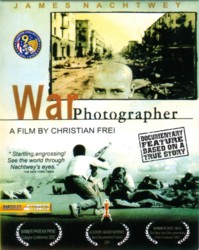BANANACUE
REPUBLIC
Vol I, No. 5
Oct 06, 2004

![]()
by H. A. de Veyra
JOURNALISM:
Through
the Lens
A Western friend asked me once about suffering. She asked, "why do people suffer more than others? Why do others suffer less? Why are we who we are, born in the situation that we are born in, and why are others born otherwise... is it possible that I could be born in a situation that would cause me to do horrible things to another human? What makes someone human?"
I once knew a photographer. His name was
Marcel. He worked for this French news bureau, and was always being
assigned where trouble was: Baghdad, Afghanistan, Bosnia, Rwanda,
Indonesia, the Gaza strip... He photographed the atrocities of war because
it was his job. He witnessed through the lens of his camera, men being
shot in front of him, women being raped, children being maimed and abused,
hungry families, hungry and dying children, poverty... and he had this one
question haunting him: If he was witness to man's inhumanity, and he
couldn't do anything about it except to take photographs, what more the
person looking at the photographs back home? I saw some of his photos,
the kind that are never printed on newspapers or magazines because they're
too real, too explicit of man's cruelty, and they stayed with me, the
images stayed with me. The suffering he witnessed everyday finally ate at
him, even up to the time he quit his profession. He went to Nepal and
joined a humanitarian group.

I came across a dvd copy of Christian Frei's film documentary War Photographer. It is about this legendary war photographer, James Nachtwey, and Frei's camera followed him for two years to 'hot spots' including Kosovo, the West Bank, and Indonesia, where we witness what Nachtwey's camera witnessed. The results of war: soldiers shooting a helpless man point blank in Kosovo; a man with no arm and no leg providing for his family that lived in the middle of two train tracks in Indonesia; men, women, and children working in mines with white phosphorous surrounding them; boys throwing stones at soldiers with guns and tanks in the Gaza strip... men going beyond their humanity.

scene from War Photographer
In a way, Nachtwey answered Marcel's
question. A photographer who places himself in the middle of a war to
show the rest of the world what is happening, is a negotiator for peace.
To make people "pay attention to what is going on, and to shake them from
their indifference." But that is all. In the film, we see what being a
witness to suffering and cruelty does to another person, and Nachtwey is
no exception. He says, "if everyone could be there to see for themselves
the fear and the grief, just one time, then they would understand that
nothing is worth letting things get to the point where that happens even
to one person, let alone a thousand."
As I remembered my friend Marcel, and watched War Photographer
again, and thought about my friend's questions, I realized why there is
suffering in the world. It is not about a tyrant's quest for power, it is
not grappling with Buddha's Middle Road, it is not about religion and
karma, nor another's inhumane acts to another. There is suffering because
people are unwilling to sacrifice and share some of the things they have,
be it an hour of their time, a few pesos or dollars, some food they end up
throwing anyway, some clothing, some smile, some kind words. Simple
things.
Those 'back home' could do a lot by doing only what they can.
"There is
suffering because people are unwilling to sacrifice and share some of the
things they have, be it an hour of their time, a few pesos or dollars,
some food they end up throwing anyway, some clothing, some smile, some
kind words. Simple things."


scenes from War Photographer